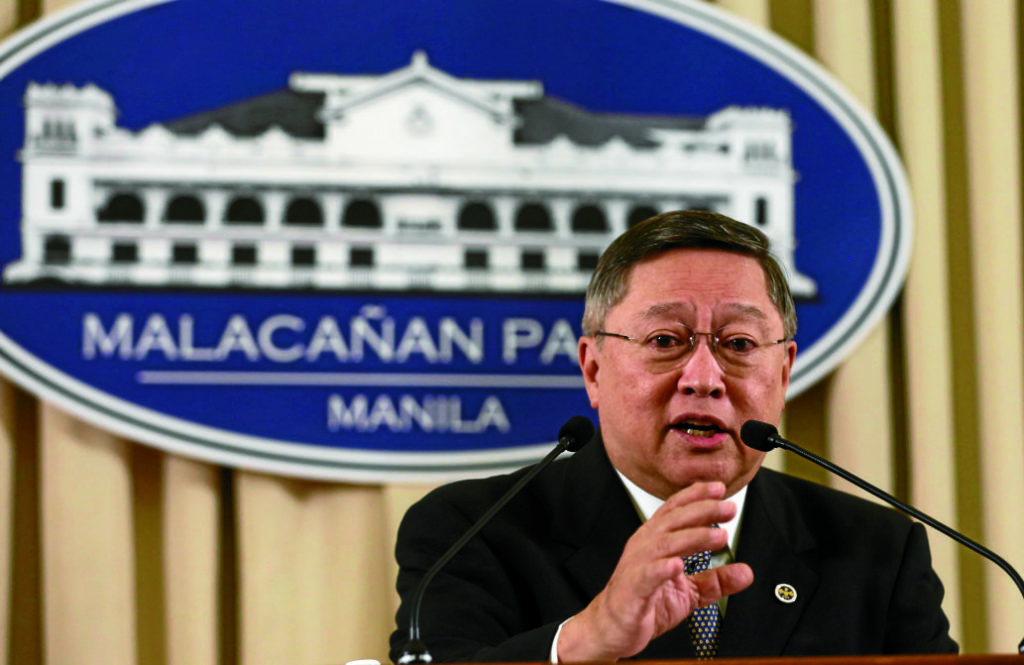DOF open on return of Marcos ill-gotten wealth for extra revenues

Finance Secretary Carlos Dominguez III(File photo by JOAN BONDOC / Philippine Daily Inquirer)
The head of the Duterte administration’s economic team is open to the proposal of the family of the late dictator Ferdinand Marcos to return the ill-gotten wealth accumulated during his 21 years in power.
“We are certainly hopeful that we get additional revenues because this is not planned at the moment. So, you know, we will encourage them to do it,” Finance Secretary Carlos G. Dominguez III told reporters last week when asked if he is amenable to accept the Marcoses’ offer to return the questionable assets in order to fund the government’s ambitious infrastructure program dubbed “Build, Build, Build.”
Under the “Build, Build, Build” program, the government plans to rollout 75 flagship, “game-changing” infrastructure projects to be started and finished in the next six years, as well as spend up to P9 trillion on hard and modern infrastructure until 2022.
“Actually, the Department of Finance is never involved directly in the negotiations with those people, it was really the Presidential Commission on Good Government. So definitely we will encourage them [the PGCC] to, you know, get as much as possible,” Dominguez said.
As for the pending cases against the Marcoses, Dominguez said the DOF was also only “marginally involved” hence will only receive the proceeds if courts order the family to return ill-gotten assets.
Last month, President Duterte said the Marcoses were open to returning part of their up to $10 billion in ill-gotten wealth, including gold bars, to supposedly help the government manage its finances. READ: Duterte: Marcos family willing to open, return ‘wealth in question’
As of last year, the PCGG already recovered a total of P170 billion in ill-gotten wealth—from Swiss bank deposits, shares of stock and real estate to paintings and jewelry—from the Marcos family and their cronies.
It was then President Corazon Aquino who formed the PCGG shortly after the ouster of Marcos in February 1986. Dominguez was Cory Aquino’s agriculture and environment minister.
Even as the government mulls to abolish the PCGG, the DOF had said that it will continue to dispose of the Marcoses’ ill-gotten wealth once cases are settled.
“The cases [against the Marcoses] are going to be transferred to the Office of the Solicitor General or the Department of Justice, and then the assets are going to be transferred to the Privatization and Management Office. That was always the plan before,” Finance Undersecretary Karen Singson told reporters last month when asked how the possible abolition of the PCGG will affect the sale of former president Ferdinand Marcos’ assets.
“If they abolished [the PCGG], we’re still going to implement. In fact, it won’t cost too much problems because the PCGG is already part of the Privatization Council so it’s still going through the DOF,” Singson had said. The interagency Privatization Council, chaired by the DOF, gives the go-ahead to all privatization activities, including those of the PCGG.
“If we get a presidential mandate that [the PCGG] has to be winded down, it will be the same plan as before, which is the [disposition of] assets, just by a different agency,” Singson had said. The DOF-attached PMO will then dispose of the Marcos assets, she said.
“The cases, of course, will continue. In fact there’s no change also in the cases because right now the PCGG’s counsel is the OSG, so it’s really the same,” according to Singson.
In January, Singson said the sale of Imelda Marcos’ jewelry collection will be considered when all cases with the PCGG on the jewelry are settled.
Last year, the Privatization Council gave its go-ahead to dispose of about P658-million worth of so-called “Hawaii Jewelry” that belonged to former first lady Imelda Marcos.
The PCGG had said three Marcos jewelry collections, dubbed Hawaii, Malacañang and Roumeliotes, were estimated by auction houses Christie’s and Sotheby’s to be worth a total of at least P1 billion.
The Hawaii collection was comprised of about 300 jewelry pieces confiscated by the US customs bureau in the namesake American state after the Marcoses fled the country.
This collection included a 25-carat “extremely rare” pink diamond believed to be previously owned by a Mogul emperor, which was estimated to be worth at least $5 million or around P237 million.
In July, Budget Secretary Benjamin E. Diokno said the government is mulling to abolish the PCGG under a wider plan to downsize the executive branch.
“There are many specific recommendations for policy actions under the rightsizing bill. One such proposal is to abolish the PCGG and to transfer its remaining activities to the DOJ,” Diokno had said, referring to the Rightsizing the National Government Act of 2017, which is currently pending Congress’ approval.
But Diokno had clarified that “it’s a proposal,” adding that there was nothing definitive about it yet.
“The decision will be made by a committee to be chaired by the Executive Secretary as proposed in the law. All decisions by the committee will be in the nature of an executive order to be signed by the President,” according to Diokno. /jpv
